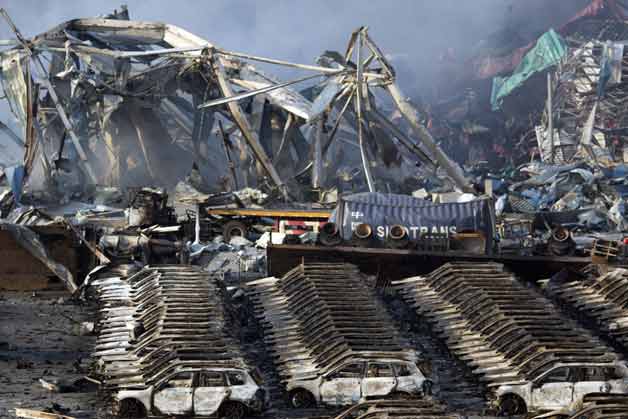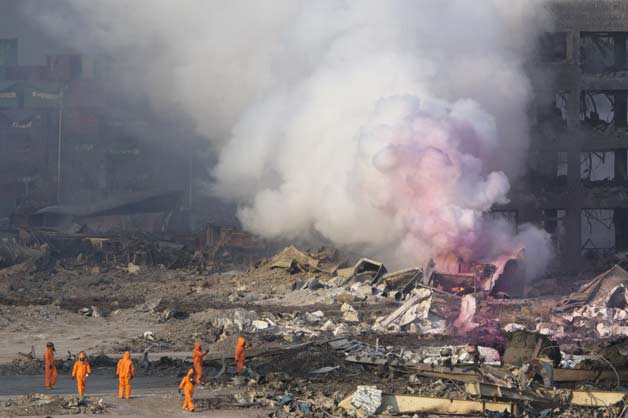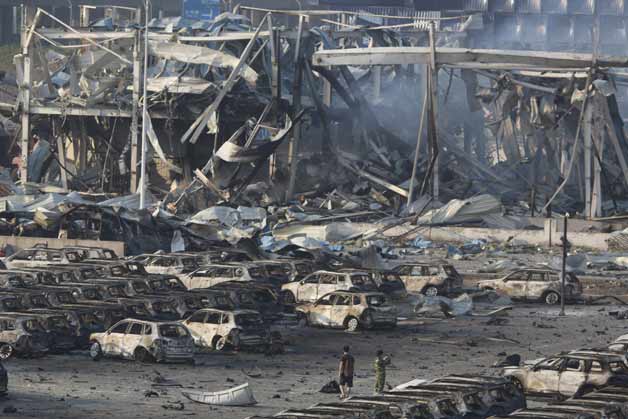
Tianjin: Powerful explosions tore through a warehouse storing hazardous chemicals in north China's major port city, killing at least 50 people and injuring over 700 others as the twin blasts sent fireballs, cars and containers raining down on panic-stricken residents.
In one of China's worst industrial disasters, the twin blasts occurred at the Ruihai warehouse at 11.20 PM local time yesterday, following a fire report half an hour earlier.
Fireballs erupted then ignited more explosions in companies nearby light up the night sky, state-run Xinhua news agency reported. The blasts were so huge that they were captured on the satellites.
Over 10,000 people were reportedly evacuated from the nearby areas in the booming port city of 15 million. People rushed in to the streets in pyjamas and many mistook the explosions for an earthquake.
Burnt-out buildings and thousands of charred containers and cars tossed around like toys could be seen as the blasts disrupted operations and traffic in the world's tenth largest post city.

The impact of the blasts could be felt several kilometres away, and was registered as seismic activity at a US Geological Survey monitoring unit in Beijing.
The China Earthquake Networks Centre said the magnitude of the first explosion was the equivalent of detonating three tonnes of TNT, while the second was the equivalent of 21 tonnes.
The shock waves were felt kilometres away, with windowpanes shattering.
A dozen firefighters were among the 50 killed while 21 others remained missing. At least 71 of the total 701 injured were said to be critical.
The cause of the explosions is being investigated and the company executives have been taken into custody. The Tianjin fire brigade said the warehouse contained dangerous goods, making the fire unpredictable and dangerous to approach.
State-run CCTV said firefighters could not use water to put it out due to presence of chemicals and instead has to use sand and other materials to contain it.
Authorities said fires were now "under initial control" after incessant efforts by hundreds of personnel to battle the blazes by spraying dry powder and burying areas in sand.
As many as 1,000 firefighters and 143 fire engines were sent to the spot, around 140 kilometres from the capital Beijing, they said.

A team of 217 military specialists in nuclear and biochemical materials has also reached here.
Air quality is normal after the blasts, according to authorities. Toxic fumes detected in the air after the blasts are within national standards, Wen Wurui, head of the city's environmental bureau said.
TV footage showed massive explosions in the city. The first explosion occurred was followed seconds later by another, more powerful and a series of smaller blasts.
It also showed a huge mushroom cloud and fire far off, with fire still raging at the place of explosions and huge smoke billowing out.
Chinese President Xi Jinping and Premier Li Keqiang have urged all-out efforts to save the injured and minimise casualties. The rescue operation will also use drones and helicopters.
While the footage of the explosions went viral on the Chinese social media, there were several eyewitness accounts describing the blasts as similar to nuclear blasts.
A media report quoted a truck driver as saying that "it was like what we were told a nuclear bomb would be like. I've never even thought I'd see such a thing. It was terrifying, but also beautiful."

Xinhua quoted Du Wenjun, a resident, as saying that he never imagined that he could see a "mushroom cloud" outside the window of his own home.
When the blast occurred, Du felt strong jolts and saw a huge column of smoke not far away.
Zhao Lirong, a 35-year-old businesswoman from Inner Mongolia, was sleeping when the blast blew off the windows and doors in her apartment, hitting her head, her son's neck and her husband's feet.
Most of the patients suffered burns, bruises, bone fractures and injuries related to the shock waves. In hospitals, blood could be seen everywhere on the floors.
As soon as the explosion was under control, some taxi drivers and private car owners have voluntarily helped with sending the wounded to hospitals.
Volunteers have arrived at hospitals for blood donation, and taxi drivers and private car owners offered help to transport the wounded to hospitals. Several hotels have provided free accommodation to residents displaced by the blast.
Schools and other sites near the warehouse opened to help the injured. An aquarium further away also offered its service centre and other amenities to the public round the clock for the rest of this week, to help aid distribution and blood donations.

















